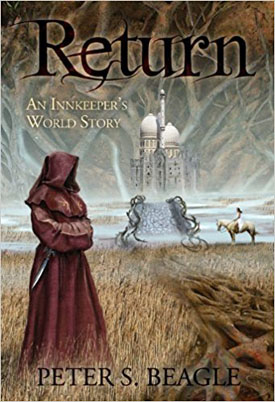 As you’ve no doubt heard many times here at GMR, there is something unique about the writing of Peter S. Beagle. There’s a “can’t quite put your finger on it” quality that is, perhaps, equal parts simple, uninflected narration, universes in which anything can happen and probably will, and that sense of wonder that few writers these days possess, all qualities present in full measure in his latest offering, Return.
As you’ve no doubt heard many times here at GMR, there is something unique about the writing of Peter S. Beagle. There’s a “can’t quite put your finger on it” quality that is, perhaps, equal parts simple, uninflected narration, universes in which anything can happen and probably will, and that sense of wonder that few writers these days possess, all qualities present in full measure in his latest offering, Return.
Soukyan has been pursued by the Hunters for some time now, and after he fends off the latest attack, he decides to visit the home of his youth, which he calls that place — a gaunt old monastery, for lack of a better word, home to an order seemingly monastic, if not entirely pious, from whence the Hunters come. He’s getting a little tired of it all. And as might be expected, Soukyan runs into the unexpected, over and over again.
When I first picked up Return, which bills itself as “An Innkeeper’s World Story,” I thought maybe I should go back to The Innkeeper’s Song and Giant Bones and refresh my memory. After about a page and a half, it didn’t matter. Yes, the characters have appeared before, but this story is self-contained. What exposition and back story we need are presented deftly and subtly, never obtrusive, but there when you need it, while characters grow as we watch. (One reason I’m so fond of Beagle’s fiction is that I reject the idea of reading as a spectator sport, and with Beagle’s stories, you’re part of the mix.) There’s an inevitable quality to the narrative, each scene the necessary successor to the scene before and the only fitting precursor to what comes after. Even the most singular events take on an air of rightness — there’s nothing else that could happen right then. (The origin of the Hunters, while bizarre — and, frankly, with a strong echo of something from Weird Stories way back when — given what we’ve seen of them, makes sense.)
It’s this circumspect quality that leaves wide latitude for interpretation, if one is inclined to interpret things, so I’m mostly not going there, except to note that Soukyan’s sex change, magically accomplished, is something that he’s been doing for a long time — he made his first appearance in these stories, in The Innkeeper’s Song, as a woman named Nyateneri. It’s a trick he learned from a wizard, and it seems to come in handy. What’s notable about it is that, whether man or woman, Soukyan is still Soukyan: there’s nothing in his essential character that demands that he be either man or woman, and the success of his masquerade is perhaps as much about how externals determine perception as about anything he does. One can also, if one wishes, draw parallels between the order that occupies that place and similar institutions in our own world. If one wishes.
It’s a slight book, a novella, thoroughly engaging and ultimately a very human story. I almost want to say “enchanting,” but it’s rather dark for that. But it’s also quite wonderful, in the broadest sense.
(Subterranean Press, 2010)
